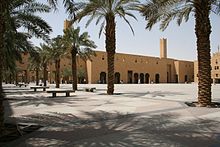Capital punishment in Saudi Arabia
Saudi Arabia is one of the leading countries with use of the capital punishment and number of executions worldwide. In 2010, there were 26 reported executions in the country.[1]
Methods and scope
Saudi Arabia has a criminal justice system based on a hardline and literal form of Sharia law due to Wahhabi Islam being the official state religion.
The death penalty can be imposed for a wide range of offences[2] including murder, rape, armed robbery, repeated drug use, apostasy,[3] adultery,[4] witchcraft and sorcery[5] and can be carried out by beheading with a sword,[3] stoning or firing squad,[4] followed by crucifixion.[5]
The 345 reported executions between 2007 and 2010 were all carried out by public beheading.[6] The last reported execution for sorcery took place in 2007 and three subsequent convictions for witchcraft did not result in execution.[6] There were no reports of stoning between 2007 and 2010,[6] but between 1981 and 1992 there were four cases of execution by stoning reported.[7]
Crucifixion of the beheaded body is sometimes ordered.[5] For example, in 2009, the Saudi Gazette reported that "An Abha court has sentenced the leader of an armed gang to death and three-day crucifixion (public displaying of the beheaded body) and six other gang members to beheading for their role in jewelry store robberies in Asir."[8]
In 2003, Muhammad Saad al-Beshi, whom the BBC described as "Saudi Arabia's leading executioner", gave a rare interview to Arab News.[3] He described his first execution in 1998: "The criminal was tied and blindfolded. With one stroke of the sword I severed his head. It rolled metres away...People are amazed how fast [the sword] can separate the head from the body."[3] He also said that before an execution he visits the victim's family to seek forgiveness for the criminal, which can lead to the criminal's life being spared.[3] Once an execution goes ahead, his only conversation with the prisoner is to tell him or her to recite the Muslim declaration of belief, the Shahada.[3] "When they get to the execution square, their strength drains away. Then I read the execution order, and at a signal I cut the prisoner's head off," he said.[3]
Capital crimes

Sharia background
The death penalty can be imposed under the three categories of criminal offence in Sharia:[10]
- Qisas: eye-for-an-eye retaliatory punishments.[10] Qisas crimes include murder.[10] Families of someone murdered can choose between demanding the death penalty or granting clemency in return for a payment of diyya, or blood money, by the perpetrator.[12] There has been a growing trend of exorbitant blood-money demands, for example a sum of $11 million was reported as being recently demanded in exchange for clemency.[12]
A conviction requires proof in one of three ways.[13] The first is an uncoerced confession.[13] Alternatively, the testimony of two male witnesses can convict,[13] unless it is a hudud crime, in which case a confession is also required.[13] Lastly, an affirmation or denial by oath can be required.[13] Giving an oath is taken particularly seriously in a religious society such as Saudi Arabia's,[13] and a refusal to take an oath will be taken as an admission of guilt resulting in conviction.[14]
List of crimes
Saudi law allows the death penalty for many crimes. For example:
- Adultery
- Apostasy
- Armed robbery
- Blasphemy
- Carjacking
- Drug smuggling
- Fornication
- Home Invasion
- Homosexuality
- Idolatry
- Murder
- Pedophilia
- Prostitution
- Rape
- Sedition
- Sexual misconduct
- Terrorism
- Theft (fourth conviction)
- Treason
- Waging War on Allah
- Witchcraft
References
- ^ "2010 Human Rights Report: Saudi Arabia". U.S. State Department. 8 April 2011. Retrieved 11 July 2011.
- ^ "Saudi system condemned". The Guardian. 9 August 2003. Retrieved 27 July 2011.
- ^ a b c d e f g "Saudi executioner tells all". BBC News. 5 June 2003. Retrieved 11 July 2011.
- ^ a b Federal Research Division (2004). Saudi Arabia A Country Study. p. 304. ISBN 9781419146213.
- ^ a b c Miethe, Terance D. (2004). Punishment: a comparative historical perspective. p. 63. ISBN 9780521605168.
{{cite book}}: Unknown parameter|coauthors=ignored (|author=suggested) (help) - ^ a b c U.S. State Department Annual Human Rights Reports for Saudi Arabia 2007-2010: "2010 Human Rights Report: Saudi Arabia". U.S. State Department. 8 April 2011. Retrieved 11 July 2011.; "2009 Human Rights Report: Saudi Arabia". U.S. State Department. 11 March 2010. Retrieved 11 July 2011.; "2008 Human Rights Report: Saudi Arabia". U.S. State Department. 25 February 2009. Retrieved 11 July 2011.; "2007 Human Rights Report: Saudi Arabia". U.S. State Department. 11 March 2008. Retrieved 11 July 2011.
- ^ Vogel, Frank E. (1999). Islamic law and legal system: studies of Saudi Arabia. p. 246. ISBN 9789004110625.
- ^ "Death, crucifixion, for jewelry gang". The Saudi Gazette. 5 Aug 2009. Retrieved 8 August 2011.
- ^ "Saudi Justice?". CBS News. 5 December 2007. Retrieved 18 July 2011.
- ^ a b c d e Otto, Jan Michiel (2010). Sharia Incorporated: A Comparative Overview of the Legal Systems of Twelve Muslim Countries in Past and Present. p. 166. ISBN 9789087280574.
{{cite book}}: Cite has empty unknown parameter:|coauthors=(help) - ^ Dammer,, Harry R. (2010). Comparative Criminal Justice Systems. p. 56. ISBN 9780495809890.
{{cite book}}: Unknown parameter|coauthors=ignored (|author=suggested) (help)CS1 maint: extra punctuation (link) - ^ a b "Saudis Face Soaring Blood-Money Sums". The Washington Post. 27 July 2008. Retrieved 11 July 2011.
- ^ a b c d e f Kritzer, Herbert M. (2002). Legal Systems of the World: A Political, Social, and Cultural Encyclopedia. p. 1415. ISBN 9781576072318.
- ^ Beling, Willard A. (1980). King Faisal and the modernisation of Saudi Arabia. p. 117. ISBN 0709901372.

